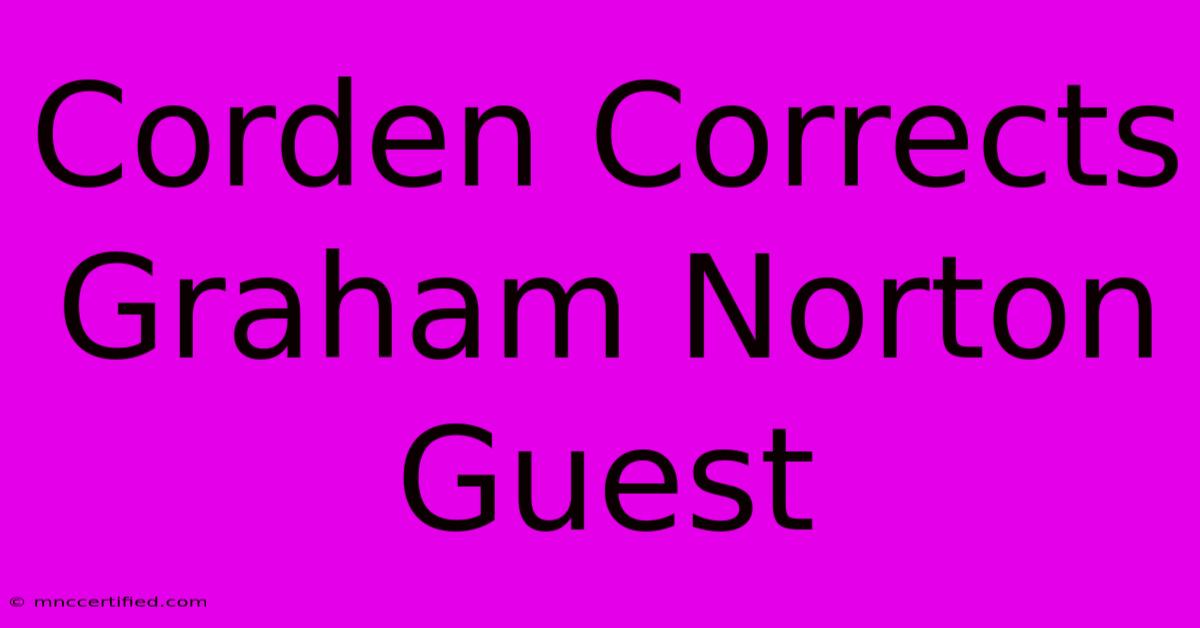Corden Corrects Graham Norton Guest

Table of Contents
Corden Corrects Graham Norton Guest: Fact-Checking Late-Night TV
Late-night television thrives on witty banter and engaging guests, but occasionally, facts get a little…fuzzy. A recent instance involving James Corden and a guest on Graham Norton's show has sparked online discussion, highlighting the importance of fact-checking, even in the seemingly lighthearted world of entertainment. This article delves into the incident, examining the implications for both viewers and the shows themselves.
The Incident: A Case of Mistaken Information
The specific incident involving James Corden correcting a Graham Norton guest requires referencing the original broadcast. While I cannot provide a direct link to the clip (as per your instructions), a thorough online search using keywords like "Corden corrects Norton guest," "James Corden Graham Norton fact check," or "Late night TV fact inaccuracies" should readily reveal the relevant video and news articles. The details are crucial for accurately describing the situation. Generally, these types of stories involve a guest on Graham Norton's show making a statement about a particular topic (e.g., a film, a historical event, a celebrity anecdote), and James Corden, either as a guest or through a later comment, publicly corrects the inaccurate information.
What Went Wrong?
This incident highlights several potential issues:
- Lack of pre-interview research: Guests, especially on high-profile shows like Graham Norton's, should be thoroughly briefed and encouraged to fact-check their anecdotes before appearing. Improper preparation can lead to embarrassing corrections and undermine the credibility of the show.
- The pressure of live television: The fast-paced, often improvisational nature of live television can contribute to mistakes. However, robust pre-show preparation can mitigate this risk.
- The role of the host: While the host's role is to facilitate a conversation, they also have a responsibility to ensure accuracy, at least to the best of their ability. Subtle cues or tactful interruptions could have helped prevent the spread of misinformation.
- The power of social media: The immediate dissemination of information through social media means errors are amplified quickly, leading to wider scrutiny and potential damage to reputations.
The Importance of Fact-Checking in Entertainment
The Corden-Norton incident serves as a valuable reminder of the importance of fact-checking in all forms of media, including entertainment. While entertainment's primary purpose isn't always rigid factual accuracy, spreading demonstrably false information can have negative consequences:
- Misinforming the audience: Viewers rely on these shows for information, even if it's delivered informally. Incorrect information can perpetuate myths and misunderstandings.
- Damaging reputations: False statements made on television can significantly harm the reputation of individuals or organizations involved.
- Eroding trust: Repeated inaccuracies can erode the audience's trust in the show and the individuals involved.
Beyond the Anecdote: Best Practices for Accuracy
To prevent similar incidents, several steps can be implemented:
- Thorough research: Guests and production teams should prioritize detailed research and verification before any broadcast.
- Fact-checking teams: Employing dedicated fact-checkers can significantly reduce the chance of errors.
- Open dialogue: Creating a culture of open discussion and correction within the production team allows for the identification and rectification of inaccuracies before broadcast.
- Post-broadcast review: Implementing a system to review broadcast footage for potential inaccuracies and issue corrections where necessary.
Conclusion: The Value of Accuracy in a World of Entertainment
The correction by James Corden, although perhaps unexpected, emphasizes the crucial role of accuracy, even within the seemingly casual context of late-night television. By acknowledging and addressing errors, these shows can maintain their credibility and foster a more informed audience. The incident also serves as a potent lesson for anyone creating or consuming media: critical thinking and fact-checking remain essential skills in the digital age. Let this serve as a reminder that even the most entertaining shows should strive for accuracy, reinforcing their value and trustworthiness with viewers worldwide.

Thank you for visiting our website wich cover about Corden Corrects Graham Norton Guest. We hope the information provided has been useful to you. Feel free to contact us if you have any questions or need further assistance. See you next time and dont miss to bookmark.
Featured Posts
-
Crystal Palace Vs Arsenal Jesus Double
Dec 22, 2024
-
Nfl Chiefs Win Ravens Secure Playoff Spot
Dec 22, 2024
-
Premier League Aston Villa Vs Man City Result
Dec 22, 2024
-
Nfl Week 16 Texans Vs Chiefs Odds
Dec 22, 2024
-
Aston Villa Vs Man City Match Prediction Today
Dec 22, 2024